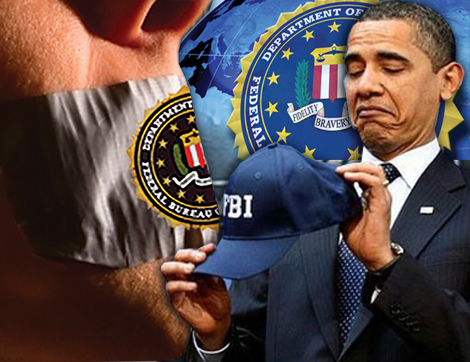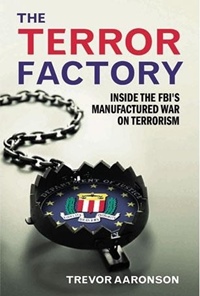
• Industry, watchdogs resist expansion of ultra-secretive, powerful surveillance program.
By Shane Smith —
It’s hard to imagine a more apt symbol of the rise of the surveillance state and death of any semblance of privacy, due
process, or liberty itself in the wake of 9-11 than the growing number of national security letters (NSLs) that have been issued.
NSLs are subpoenas issued by the Federal Bureau of Investigation (FBI) to essentially anyone on whom they want to gather information. They are warrantless and secretive and come with an automatic gag order—if you receive one, you aren’t allowed to tell anyone at all about it.
They are issued by the thousands each year to banks, Internet and telephone companies, and anyone else the FBI chooses to serve them to. In 2004 alone, the FBI handed out a staggering 56,507 NSLs, according to the Electronic Frontier Foundation (EFF), a government watchdog group. Over 300,000 were issued in the past 10 years.
Emigrate While You Still Can! Learn More . . .
This kind of unchecked power is, naturally, the perfect environment for unhinged abuse, so it follows that Congress should keep the tightest rein possible on just what the FBI can ask for with an NSL. Currently, the FBI can only legally request “non-content” information from telephone, bank, and Internet companies such as name, address, financial information, phone, and email records, which is quite a bit in itself. But that’s not enough for the FBI, which now wants effectively unrestricted access to everything one does online.
This expanded power would be granted to the FBI via the Senate’s Intelligence Authorization Act of Fiscal Year 2017, as well as by an amendment to the Electronic Communications Privacy Act of 1986 (ECPA) reform bill, where the massive expansion of power is treated as merely a corrected typo to earlier legislation.
EFF has fought this covert power grab from the beginning and issued a statement on June 7 regarding attempted surveillance expansion. It reads, in part:
The Senate’s proposed changes would allow the FBI to get a much larger range of Internet records, such as email to/from headers, Internet browsing history, and more, all of which it could not previously get with an NSL. Particularly given the FBI’s well-documented history of abusing NSLs, EFF opposes expanding the scope of this unconstitutional surveillance power to include even more revealing records. Yesterday we joined with a broad coalition of organizations and companies to urge the Senate not to pass these proposals.
Facebook and Google, for their part, have opposed the expansion of NSLs, as well. According to a June 7 article in The Guardian, the Internet giants sent a letter to Congress warning of the proposed power grab’s effect on privacy.
It should be noted that the power to collect the entire browsing history of a single person has more value to an overreaching government than the specific content. It could be potentially used as a weapon of blackmail, or as a way to discredit an undesirable critic. Given the way the United States government has treated whistleblowers and activists in the past, this must be seen as a potential result of the ability to collect browser history.
The excuse for the existence of NSLs as a tool of the federal government has always been terrorism. But where is all this terrorism, exactly? The much-hyped plots that have been “foiled” by the FBI have turned out to be nothing but sting operations, with the FBI itself goading or strong-arming some gullible Muslim man into blurting out on tape that he wants to commit terrorism. The cavalry proceeds to descend upon this man, and the headlines go up the next day in the mainstream news outlets about how our competent and tireless law enforcement has kept us safe.
Softcover, 284 pages
The entirety of the surveillance state is built upon this shallow paranoia about terrorism. Upon this, a legion of bureaucracy-climbing incompetents are doling out these tyrannical subpoenas.
And there is no evidence that NSLs have helped thwart any attack on the American public. This is the rub: The existence of NSLs in themselves is an attack on the American public, because they attack the public’s liberty.
Liberty keeps Americans safe, not the federal government—not only from terrorism, but from the very government that professes its desire to keep us safe from endless non-existent threats. To understand that these secretive subpoenas are an enemy of liberty, one must understand that the true enemy is the entity that most desires that your attention and outrage be directed at anything other than that enemy. It is the entity that’s incessantly lecturing you on what to fear next. Through the manipulation of fear, the federal government can loosen the chains that wiser men had previously placed around it.
A sufficiently politicized fear can be directed like a laser away from the institution that most deserves it. A fearful population will grant their government almost any power. Now that the paranoia has passed, now that it’s become harder to keep the people in a state of perpetual fear, it’s time to strip the government of the power it has grabbed during the last 15 years of the phony War on Terror. The power to issue NSLs is as good a place to start as any.
Shane Smith is a freelance writer with an economics background, who lives in Norman, Oklahoma. This article originally appeared on the website Red Dirt Report.


